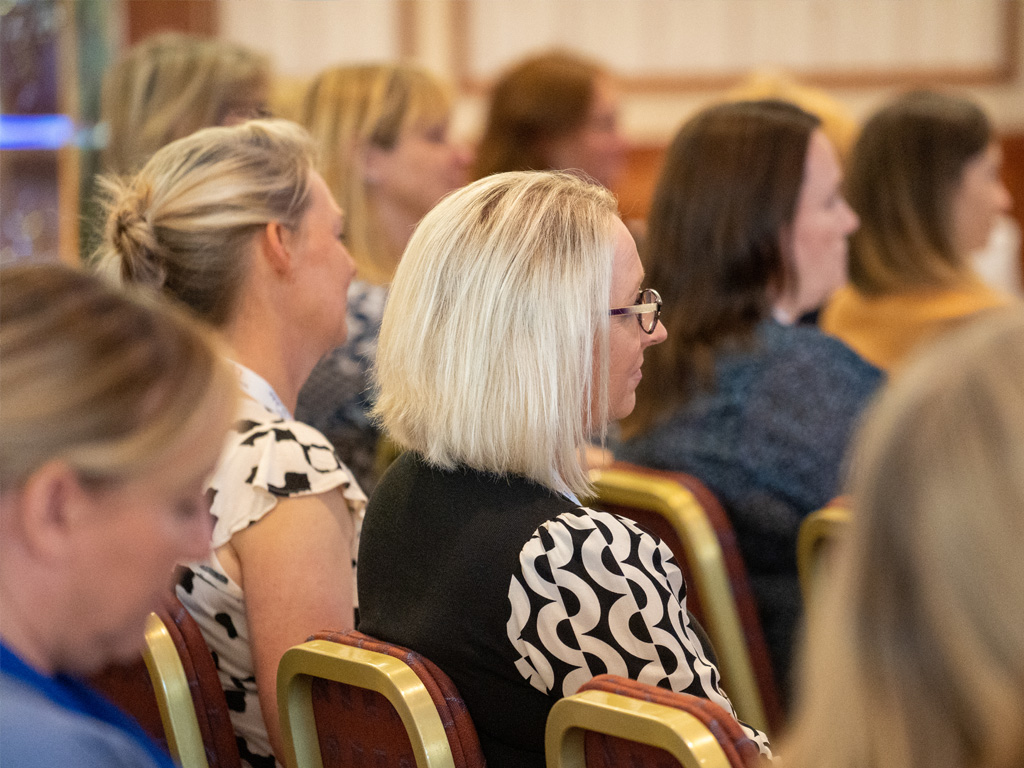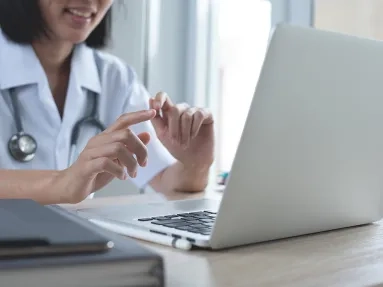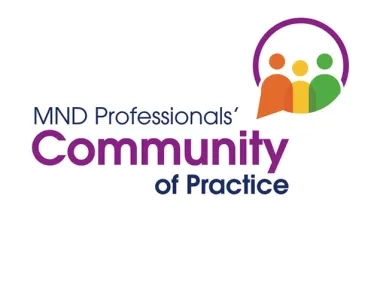
Here is a comprehensive list of the education events and opportunities that we offer this year. Click on the drop-down menu to get more information about the location and speakers, and to book your place.
You can learn more about each type of event here.
Please contact us at education@mndassociation.org if you have any queries about our education offering for health and social care professionals.
Webinars
Digital health and remote monitoring: transforming patient care in MND - 27 January 2026
Time: 11.00am – 12.30pm
Aim: To explore how digital health technology, such as Telehealth in MND-Care (TiM-C), can support MND healthcare delivery, improve patient outcomes, and enhance system efficiency.
By the end of this webinar, participants will be able to
- define the concept of digital health and explain the role of remote monitoring
- identify key technologies and tools used in remote monitoring
- discuss the benefits and challenges of TiM-R
- reflect on future trends and opportunities presented by digital health.
Speaker: Liam Knox, BSc., PhD. Research Fellow, Faculty of Health Deputy ECR Lead - Sheffield Institute for Translational Neuroscience (SITraN)
Multidisciplinary teams: working effectively in them and with them - 24 February 2026
Time: 11.00am – 12.30pm
Aim: To explore the key principles, dynamics, and practical strategies that underpin the effective operation of a multidisciplinary team (MDT), highlighting how collaboration across diverse professional roles can enhance outcomes, communication, and service delivery.
By the end of the webinar, participants will be able to:
- understand the core components and functions of an effective multidisciplinary team
- identify the roles, responsibilities, and contributions of different professionals within an MDT
- examine common challenges and barriers to effective team working, and discuss strategies to overcome them
- explore real-world examples and insights from panel members on successful MDT collaboration
- reflect on how principles of effective teamwork can be applied in their own professional settings to improve outcomes.
Speaker panel – Beth Pudjianto, Erica Littlewood and Rachel Thomson, MND Care Centre Coordinators – Birmingham, Nottingham, Suffolk
Environmental controls: bringing it all together - 28 April 2026
Aim: To increase understanding of environmental control systems and their role in supporting independence, safety, and quality of life for individuals with MND through collaborative multidisciplinary assessment, selection, and implementation.
By the end of this webinar participants will be able to:
- define what environmental control systems are and explain their purpose
- describe the range of technologies available — from simple switch-based systems to integrated smart home and voice-controlled environments
- understand the roles of different members of the multidisciplinary team in assessing needs and implementing/referring to appropriate solutions
- discuss key factors influencing successful adoption, including accessibility, usability, training, and user engagement
- examine real-world examples or case studies demonstrating the impact of environmental controls on independence and participation.
Speaker: Simon Judge, Service Lead, Clinical Scientist, Barnsley Hospital Assistive Technology
Better conversations: getting to the root of communication - 17 June 2026
Time: 11.00am – 12.30pm
Aim: To better understand communication for people living with MND and ways to support conversation.
By the end of this webinar, participants will have:
- a wider understanding of communication change in MND
- considered what is meant by conversation
- had an introduction to how conversation works
- explored the barriers and facilitators to conversation
- been introduced to the Better Conversations MND resource.
Speakers: Professor Steven Bloch, MRSCLT and Sophie Stribbbling, MRCSLT
Caring for carers - 25 November 2026
Time: 11.00am – 12.30pm
Aim: To enhance healthcare professionals’ understanding, confidence, and capability in delivering consistent, equitable, and structured support to informal carers of people living with Motor Neurone Disease (MND).
By the end of the session, participants will be able to:
- recognise the essential contribution of informal carers in MND care
- understand current challenges and variations in the provision of carer support
- identify best-practice principles for assessing and addressing carer needs
- consider how carer outcome measures can inform and enhance routine practice
- consider professional roles and responsibilities in supporting carers
- reflect on personal and organisational approaches to carer support and identify areas for improvement.
Speaker: Rosie Bamber, Specialist Occupational Therapist & Doctoral Researcher, MND Care and Research Centre, Sheffield Teaching Hospitals NHS Foundation Trust
Conversations with...
Details of future sessions coming soon.
Workshops
Cognitive deficits and behavioural symptoms in MND: beyond the motor cortex
Time: 09:30-16:00
Dates and locations: choose your location preference
North: Wednesday 6 May 2026 - The Copthorne Hotel, Clippers Quay, Salford Quays, M50 3SN, Salford, Manchester.
South: Tuesday 10 November 2026 - National Council for Voluntary Organisations (NCVO), Society Building, 8 All Saints Street, London, N1 9RL.
Cost: £50.00 View Events Cancellation Policy
Aims:
To introduce members of the MDT to behavioural symptoms and cognitive deficits in MND.
By the end of the one-day session, participants will have an understanding of:
- the impact of cognitive and behavioural symptoms on the patient
- the impact of cognitive and behavioural symptoms on the family: change in relationships
- introductory knowledge of research in this area
- the international ALSFTD diagnostic criteria
- the main behavioural symptoms in MND
- the differences between behavioural symptoms and mental health issues in MND
- clinical assessments to use in practice
- how to make interpretations of the assessments, in combination with clinical reasoning, and the above learning points.
Lead Speaker: Professor Eneida Mioshi, University of East Anglia
Guest Speaker: Sue Heal, MND Association Volunteer and person affected by MND
Navigating emotional conversations: equipping the MDT with knowledge, confidence and communication skills
Time: 9.15 am – 4.45 pm
Cost: £50.00 View Events Cancellation Policy
Dates and locations: choose your location preference
Workshop 1: 25 February 2026 - Woburn House Conference Centre, Tavistock Square, WC1H 9HQ, London
Workshop 2: 7 July 2026 – The Link Hotel, Ashby Rd, LE11 4EX, Loughborough
Workshop 3: 22 September 2026 – The Copthorne Hotel, Clippers Quay, Salford Quays, M50 3SN, Salford, Manchester
Aim: To equip MDT members with the knowledge, confidence, and communication skills needed to conduct complex and emotionally challenging conversations in a compassionate, collaborative, and person-centred manner.
Objectives:
By the end of the workshop, participants will be able to:
- recognise the emotional, ethical, and cultural complexities that can make conversations challenging for patients, families, and professionals
- apply evidence-based communication frameworks to structure sensitive conversations and respond to distress, denial, or disagreement
- demonstrate practical strategies for managing conflict, uncertainty, and differing perspectives within families and professional teams
- reflect on personal values, biases, and emotional responses that may influence engagement in ACP discussions
- collaborate effectively with colleagues to ensure consistent, coordinated, and person-centred communication about care preferences
- develop an individual action plan to apply new insights and skills in participants’ own professional contexts.
Speaker: Dr Ray Owen, Consultant Clinical Psychologist, Health Psychologist, Peer Reviewed ACT Trainer
MND Respiratory programme — Northern Ireland
Time: 9.15 am – 4.00 pm
Cost: £50.00 View Events Cancellation Policy
Date and locations:
Workshop: 9 June 2026 – Dunsilly Hotel, 20 Dunsilly Road, Antrim, Co. Antrim, BT41 2JH Northern Ireland
Aim: To introduce nurses and allied health professionals to respiratory assessment and management for people living with MND.
Objectives:
By the end of the workshop, participants will:
- have been introduced to respiratory failure, and its progression, in the context of MND
- recognise the indications of possible respiratory failure from other symptoms
- be able to describe the respiratory assessments, including sleep studies, which may be performed on people with MND with suspected respiratory failure
- have been introduced to evidence which supports the use of NIV with MND patients
- understand the equipment and different modes and settings used in non-invasive ventilation
- be able to explain secretion clearance and cough assistance techniques in order to support the people with MND in their care and prepare them for the procedures
- have been introduced to some of the pharmacological options for secretion management
- have had an opportunity to explore case studies and, through knowledge application and discussion, identify the presenting problem and the appropriate action to take.
Speakers:
- Charlotte Hardaker, Respiratory Physiotherapist, Bristol Royal Infirmary
- Kathryn Crawford, Band 7 Respiratory Physiotherapist, Belfast
- Claire Stewart, NIV Specialist Nurse, Belfast Health and Social Care Trust
Competency builder sessions
ACT principles for health and social care professionals
Time: 09:30 – 4:30
Dates: we will be offering this one-day online workshop on three separate dates:
- 10 March 2026
- 19 May 2026
- 15 July 2026
Cost: : £50.00 View Events Cancellation Policy
Aim: To build the foundational knowledge and practical skills allied health professionals need to confidently apply Acceptance and Commitment Therapy (ACT) principles in clinical practice.
Objectives
By the end of the workshop, participants will:
- have an experiential understanding of the six ACT processes
- have explored some of the psychological challenges in MND
- understand how ACT principles can be applied to these psychological challenges
- have practised applying some of these principles to these psychological challenges
- have considered how to integrate ACT principles within the scope of their professional practice
- recognise professional boundaries with respect to the application of ACT principles in their clinical practice
- recognise some of the common barriers and pitfalls when using ACT principles with clients.
Speakers:
- Dr Emily Mayberry, Senior Clinical Psychologist, CCAG Postdoctoral Fellow and SITraN Honorary Senior Lecturer, Sheffield Teaching Hospitals
- Rebecca Gould, PhD, DClinPsy, Professor of Psychological Therapies & Honorary Clinical Psychologist, University College London
Understanding genetic test options and talking about it with people in your care
Time: 09:20-16:15
Dates: we will be offering this one-day online workshop on two separate dates:
- 15 April 2026
- 1 July 2026
Cost: : £50.00 View Events Cancellation Policy (attached document)
Aims: To build the confidence of health and social care professionals to discuss genetics and genetic testing and understand the genetic testing pathway.
Objectives:
By the end of the one-day session, participants will:
- understand the basic genetics of MND
- have been introduced to the genetic testing pathway, who is involved, and their role, as HSCPs, in it
- have considered how and when to discuss genetics and genetic testing with their patients
- understand what genetic counselling is and its importance
- have explored and discussed more complex case studies relating to genetic testing and the delivery of results.
Speakers
- Dr Alisdair McNeill, Senior Clinical Lecturer in Neurogenetics and Hon Consultant Clinical Geneticist
- Dr Jade Howard, Postdoctoral researcher
- Dr Amina Chaouch Neurology Consultant and Co-director of the Manchester MND Care Centre
- Dr Rhona MacLeod, Consultant Genetic Counsellor and Honorary Senior Lecturer
- Georgia Brown, Genetic Counsellor and additional guest speakers.
Information and Knowledge Exchanges
Information and Knowledge Exchange events are exclusively for members of the MND Professionals' Community of Practice, a peer led group of health and social care professionals encouraging and supporting the development of good care for people living with, or affected by, MND.
New management strategies for bulbar and saliva challenges - 16 March 2026
Time: 11.00 am – 1.30 pm (breakout discussions from 1pm)
This IKE will explore the management of two common and complex issues in MND: swallowing difficulties and secretion management. These challenges affect quality of life, nutrition, hydration, and emotional wellbeing.
Victoria and Anthony will present new management strategies to support best practice, highlighting the multidisciplinary team’s role. You’ll hear how issues like fatigue, aspiration risk, thick or thin secretions, and a person’s dignity can be better addressed - and how to adapt this care in your local setting.
IKE presenters:
- Anthony Hanratty, Advanced Nurse Specialist and Clinical Lead, Middlesbrough MND Care Centre
- Victoria Edwards, MND Care Coordinator, Cambridge MND Care Centre
Holistic management of upper limb weakness in MND: optimising quality of life and minimising risk - 25 June 2026
Time: 11.00 am – 1.30 pm (breakout discussions from 1pm)
This session will provide holistic and functional considerations to managing upper-limb weakness in MND, focusing on adaptive strategies, equipment, and clinical approaches that enhance independence and safety. Attendees will gain actionable insights into optimising quality of life for people with MND and supporting carers through practical and personalised interventions.
IKE presenters:
- Liz Hollway, Clinical Specialist Occupational Therapist, Florence Nightingale Community Hospital
- Lauryn Campbell, Orthotist, Opcare
- Jane Smith, Specialist Occupational Therapist, Weldmar Hospicecare
Managing expectations: of your role, your service and yourself - 9 September 2026
Time: 11.00 am – 1.30 pm
Further details about this session will be shared shortly.
IKE presenters:
- Rachel Woolwich, Clinical Psychologist, Oxford MND Care and Research Centre
- Caroline Bidder, Network Lead Care Coordinator, South Wales MND Care Network


